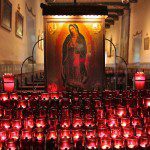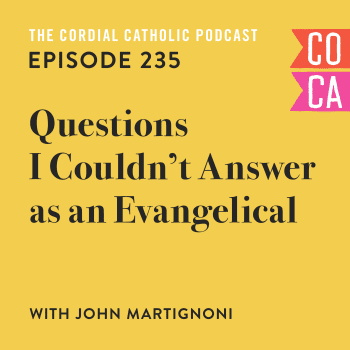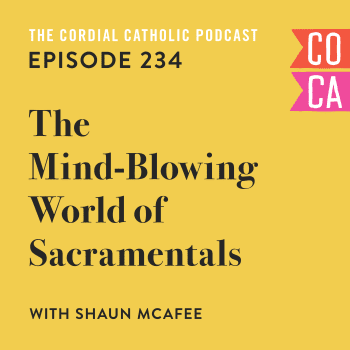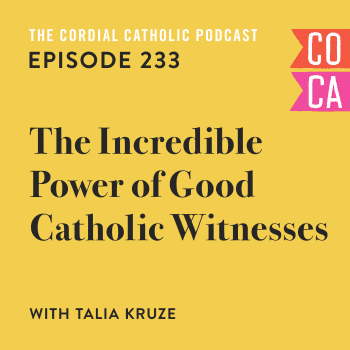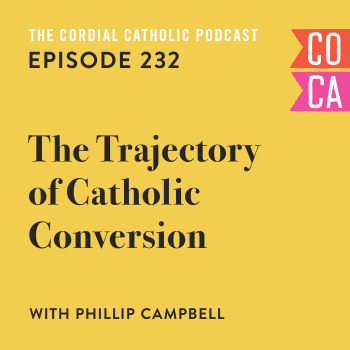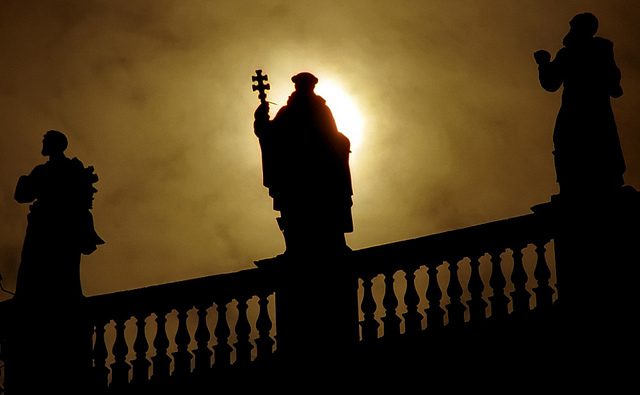
Ask my wife, I’m not always altogether emotionally stable. It’s no secret. Sometimes I get a little bit intense, and sometimes I get a little bit depressed, and sometimes I struggle. I can honest about that, I’m a human being.
Recently, one of these struggles became an complete existential crisis.
It wasn’t the first time I was stopped in my tracks or the first time I’d harboured serious doubts about this faith journey that I’m on. Likely, it won’t be the last. But I’ve learned a lot of things and each set back has been an incredible opportunity for growth—often profound spiritual growth—so I wanted to share a bit of honest experience with you.
Sometimes I wonder if there’s even any point of continuing on my current trajectory. This was the tenor of the aforementioned existential crisis.
I stood in the backyard, in the dark, praying the rosary and waiting for a pot of soup to cool down in the snow. It was, obviously, an odd configuration of things.
Do I really want to be a Catholic? Do I need to be a Catholic?
These are the sorts of things I think of during existential crises.
I’ve had poor experiences with my RCIA classes. Classes meant to usher in the heathen masses into the most beautiful and profound narrative unfolding over all space and time: The Holy Catholic Church. In my own personal experiences, these classes have been less than edifying. What I mean is, they haven’t been edifying for me—they haven’t been at my pace or met my needs or been what I was hoping they’d be and that’s been a major setback. But I’ve taken it in stride. I’ve taken it as an opportunity, like I said, in the disguise of a setback. This has been God telling me something: It isn’t all about me.
I’m not the centre of the universe, go figure.
Timing is important, too. I’m sure I could rush my acceptance into the Church and beg a priest, anywhere, to admit me into Communion and I’m sure someone with a collar, somewhere, would go for it, but that would be my agenda and on my timeline. Instead, I trust the Lord knows what’s best and that I found this particular RCIA class at this particular Catholic parish for a reason. It’s constantly a setback, but it’s also, constantly, an opportunity for growth—and for faith, and trust, and humility (which I need most of all, amen).
I’ve also felt setback by the experience—the example—of other Catholics.
G.K. Chesterton, Catholic convert from Anglicanism, writes of this exact experience in The Catholic Church and Conversion a book that if you know me and read this blog you will know that I love dearly. Chesterton writes that at a certain point in a Protestant’s conversion the only thing that can really shake them from their path into the Church is, more often than not, the poor example (in words or deeds) of another Catholic.
That’s exactly it.
Hearing, reading, or observing things that those already inside the Church sometimes do, as I get closer to joining, has been a setback as well.
“If he’s a Catholic and that’s what he says about Islam why would I want to be a part of that Church?”
But for all the roadblocks, all the setbacks, all of the difficult circumstances and dark days the blessed words of St. Peter, on whom Catholics believe Christ founded the Church, keep ringing in my ears, “Where else can we go?”
Where else can I go?
I think of this when something sets me back, or stirs me up, or drags me down. If not the Catholic Church, where else could I go?
Because sometimes I wonder if there’s any point in going forward. Sometimes it’s difficult.
I couldn’t be happy as a Protestant, I know this much.
I’ve turned it over in my head every which way and I’m passed that point. I couldn’t do it. First things, my struggles with reconciling how Scripture is interpreted within Protestantism are too great. It doesn’t make sense to me that a loving God, who prayed, in the Person of Jesus, for Christian unity would’ve left us with a Bible that needs interpreting and, in the interpreting, we get so many different conclusions. I can’t figure my way out of that because Protestant denominations differ on enormous issues like the means of salvation and the sanctity of life.
The closest, admittedly, that I’ve come to a solution that seems workable, that seems acceptable, is that proposed by former Anglican bishop N.T. Wright. However, even in his case, when his formula of interpreting Scripture through thematic, contextual reading, community, and scholarship is actually applied it doesn’t work to prevent schism and discord—you need look no further than the desperate status of the Anglican Communion world-wide.
Plenty of groups of Christians can read Scripture contextually, consult scholars, and pray earnestly about it and still come to different conclusions. Thoughtfully applying Wright’s formula—as good as it is—doesn’t provide Protestants with a way out of the difficult, murky waters of Scriptural interpretation and authority.
Where else can I go?
Likewise, as a Protestant on the way to Catholicism I’ve been swept away by Catholic forms of worship and devotion. The beauty and reverence of the Mass is something I’ve never even close to experienced on a Protestant Sunday morning. The appeal and simple beauty of the rosary, the missal, lectionary, the liturgial calendar, the rich symbolism of worship, and the Liturgy of the Hours. It’s been precisely these things that have gotten me through dark times and difficult moments as I struggle along on this journey. It’s been a particularly moving Mass, at a particularly disappointing time, that has taught me that giving up would be foolish (and that pressing on is the answer). Ironically, it’s been Jesus moving through the Catholic stuff, in the midst of my doubts about Catholicism as a whole, that has brought me through.
Finally, it’s the uniquely Catholic theology that I’ve learned too much about, that resonates too strongly, to be able to abandon it at this stage of the game. It’s theology I was never able to understand or reconcile as a Protestant: Confession, the Communion of Saints, Jesus’ High Priestly Prayer, the Bread and Wine Discourse, Justification, and Paul’s discussion of our works being proven in fire (and its purgatorial implications). As bizarre as some of this Catholic theology may sound to the ears of my readers—and God bless you for reading it—it’s the stuff that’s begun to be woven into my way of thinking. It’s stuff that’s become well-tread territory, and deeply rooted in my understanding of my faith. It’s stuff I would’ve scoffed at even a year ago but it’s also the stuff, like confession, for example, that I’ve been puzzled about for years as a Protestant.
In Catholicism is a satisfying and edifying solution to these theological conundrums. So, where else could I go?
On those difficult days, and in those challenging moments, I do find myself wondering what all this is for. I’ve come close, and I’ll come close again, to quitting, but there has always been something—I believe it’s a Someone, more likely—that’s been ushering me along. When I think of giving up, of giving in, I think about what it would mean and how I could be satisfied and how I could feel OK with myself and my decision and I can’t. I can’t remain a Protestant even, in those moments, when I desperately want to, when it would be much easier socially, emotionally, and relationally—when I’m set back and set to stumble and challenged.
Instead, the Lord leads me on and through those difficult times; in spite of the poor catechises at my parish church, in spite of the poor examples of Catholic piety, in spite of my own doubts and the emotional roller coaster of bleak, dark winter days. I’ve never been in such a strange place with my faith, a place of sometimes frustration, but a place of deep certainty. A place where I’m vexed, on the one hand, but encouraged on the other. A place where I know I can’t go back, but going forward seems an insanity sometimes.
As I finish the first draft of this article the clock approaches six. The bells from the church down the street where the Lord dwells in the tabernacle, as I write, will ring the Angelus, a reminder and call to prayer. I’m going to go and open the window, let the frigid winter air in, so I can hear them ring more clearly.

